The President's Message – 4 September
Hello, I’m Dr Jacqueline Small, President of the Royal Australasian College of Physicians. I would like to acknowledge the Gadigal people of the Eora Nation as the traditional owners and custodians of the lands I am speaking on today. I extend my respect to all Aboriginal, Torres Strait Islander, and Māori people. Together we restate our shared commitment to advancing Aboriginal, Torres Strait Islander and Māori health and education as core business of the RACP.
Bullying is still a pervasive problem while training in our profession. In Australia, the most authoritative survey on the subject is the Medical Training Survey, run by the Medical Board of Australia. Last year it identified that over one third of trainees across all medical disciplines experienced or witnessed bullying. Fifty-five per cent of Aboriginal and Torres Strait Islander trainees had experienced or witnessed bullying. Sadly, there’s also an increase in patients and families or carers who bully trainees, up from 38 per cent in 2021 to 45 per cent last year. These are appalling figures.
More so when we hear that 70 per cent of trainees who experienced bullying, harassment, discrimination, or racism didn’t report it. And why? Fifty-five per cent of them said they didn’t because they were worried about repercussions. Fifty-one per cent said nothing would be done if they did report it.
Our own Physician Training Survey looks in detail at our trainee cohort in both Australia and Aotearoa New Zealand. Last year, around 20 per cent of trainees in Aotearoa said they’d experienced bullying, and nearly 40 per cent said they’d witnessed it. The most likely perpetrators were either other doctors who were not directly involved in their training - or patients, their carers, or families. Only 15 per cent were supervisors, and five per cent were training directors. Nonetheless, this is totally unacceptable, and breaches College policy
We have policies and expectations around the behaviours we expect of our Fellows and trainees in our training programs – they’re outlined under professional behaviours on our website. On our eLearning portal you’ll find a resource Creating a Safe Workplace enabling you to identify and respond to bullying and harassment in the workplace. It includes tools for developing preventative strategies, dealing with bullying and harassment, and where to find support. The College and the Board are now exploring the degree to which we can more actively use accreditation to ensure training settings are safe from the outset.
In Australia, this year’s Medical Training Survey is now open and I encourage you to participate. This is an important chance to highlight things like safe training environments and access to flexible work arrangements. There are new questions on trainees’ caregiving responsibilities, allowing us to better understand how training experiences vary for those with carer responsibilities. Following the recent revision of the RACP’s Flexible Training Policy, we are looking forward to gathering more insights in this crucial domain.
At a recent meeting of the Health Ministers of Australia that I attended as President RACP, it was made clear that the Ministers are looking to us to take ownership and a lead to address this problem. I am confident that if we come together to raise awareness of the extent of bullying, the extent of impact for our trainees, junior staff and colleagues as well as on patient care, we can and will make a difference. Health system pressures are likely to be contributing. As physicians, we can each build skills to enable us to more confidently raise concerns about bullying when we experience it. And we can together change the culture that permits bullying to continue.
On a more positive note, I would like to congratulate those who recently presented their research at the RACP Trainee Research Awards Symposium. Details about this prestigious event are below, but a special mention to the winners, Dr Michelle Scoullar from Victoria and Dr Gavin Huangfu from Western Australia.
Now, onto some different topics. You may have seen our recent media statement supporting the Aboriginal and Torres Strait Islander Voice to Parliament in Australia. A First Nations Voice to Parliament is a critical step towards genuine reconciliation and will lead to real health benefits for Aboriginal and Torres Strait Islander people and their communities.
For our Indigenous Australian trainees, our College now has an online First Nations Trainee Wellbeing Program, developed and run by Blak Wattle, an Indigenous provider. If you want to find out more, there are details in this eBulletin. As President, I am very proud that we are supporting a Voice to parliament, in the same year that we supported the inclusion of an Indigenous Object to our College constitution.
Finally, a reminder to all trainees and Fellows that if you’re in Sydney, you’re always welcome to visit our Fellows Lounge and the History of Medicine Library at 145 Macquarie Street during business hours. They’re here for your use as part of this beautiful, historic listed site. We’d love to see you here. To make a booking to see the History of Medicine Library, please contact library@racp.edu.au or call the College.
Thank you for watching.
Dr Jacqueline Small
RACP President
To contact Jacqueline, please email president@racp.edu.au
The Australian Government has announced the Indigenous Voice to Parliament referendum will be held on Saturday, 14 October. The RACP made a public statement supporting the recognition of Aboriginal and Torres Strait Islander people in the Australian Constitution and the establishment of a First Nations Voice to Parliament.
We believe a First Nations Voice to Parliament is a critical step towards genuine reconciliation and will lead to real health benefits for Aboriginal and Torres Strait Islander people and their communities. The RACP recognises the ongoing legacy of colonisation and its impacts on the physical, emotional, and spiritual health of all First Nations Australians. The legacy of colonisation continues to manifest through disparities that affect equitable health outcomes for Aboriginal and Torres Strait Islander people and their communities.
By actively listening to the voices of First Nations Australians in the decisions that impact their lives, we can work more effectively to build trust and heal, improve access to culturally safe healthcare services and support better health and wellbeing outcomes for First Nations people overall.
Read the media release
The Australian Government is developing a national strategy to prepare the health system for climate change and lower its emissions. The RACP recently made a submission to guide the strategy’s development. In addition, we led a group of 13 medical colleges, representing more than 100,000 doctors, in a joint statement, calling for the strategy to be well resourced and comprehensive. The joint statement received high-profile, national media coverage. You can watch RACP President, Dr Jacqueline Small's interview with ABC TV.
Sign the petition in support
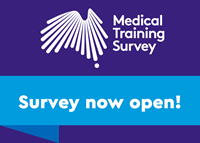 The Medical Board of Australia’s Medical Training Survey (MTS) is now live and open until early October. All doctors-in-training in Australia, including RACP trainees, are eligible and encouraged to participate. This year’s survey will build on results from past years and help our College monitor trends in training experiences over time. Results from last year’s MTS revealed overall satisfaction with workplace training experiences, but raised concerns around intensifying workloads, troubling workplace culture, and inadequate access to flexible working arrangements.
The Medical Board of Australia’s Medical Training Survey (MTS) is now live and open until early October. All doctors-in-training in Australia, including RACP trainees, are eligible and encouraged to participate. This year’s survey will build on results from past years and help our College monitor trends in training experiences over time. Results from last year’s MTS revealed overall satisfaction with workplace training experiences, but raised concerns around intensifying workloads, troubling workplace culture, and inadequate access to flexible working arrangements.
If you are an RACP trainee, do not miss this important feedback opportunity. Your experiences will be used to enhance education and training experiences for others.
The RACP will use the 2023 survey findings to:
- help strengthen our training programs and activities
- identify and address wellbeing issues
- provide training settings with data to encourage and focus improvement
- inform Training Setting accreditation activities.
How can trainees access the survey
A survey link is provided to trainees once they renew their medical registration with Ahpra. Further details can be found by visiting the Medical Training Survey website. If you have questions regarding the MTS, please email MTS@ahpra.gov.au.
Find out more
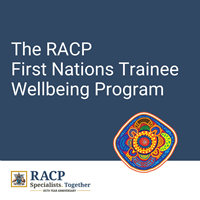
The RACP’s inaugural
First Nations Trainee Wellbeing Program is now open for enrolment from RACP Basic Trainees who identify as Aboriginal and/or Torres Strait Islander. The program is being delivered by the team at Blak Wattle Coaching & Consulting. It includes a series of four online group workshops and resources that will use Aboriginal knowledge systems to nurture
and support the wellbeing and resilience of participants. The program runs over six months and is fully funded by the College.
Expressions of interest are sought for an RACP trainee or Fellow to join the Australian Digital Health Agency's National Secure Messaging Governance Committee. Your role will be to provide expert physician or paediatrician perspectives on key decisions relating to the strategy and implementation of the National Secure Messaging Network. As an RACP representative, you will have voting rights for decisions made within this forum.
Find out more about this opportunity and submit your expression of interest before Thursday, 7 September 2023.
Find out more
Don’t leave it to the last minute. Now is the time to nominate that colleague deserving of recognition for outstanding contributions and achievements. Nominations are being called for these prestigious College Awards and are open until Saturday, 30 September 2023.
Find out more about:
Full details are available on the RACP Foundation website. Please email the RACP Foundation with enquiries.
The Eric Susman Prize is presented by the College for best contribution to the knowledge of any branch of internal medicine (adult medicine and paediatrics). Nominations are open until Friday, 15 September 2023. The deserving Fellow will have demonstrated an outstanding and lasting contribution in the areas of research, teaching and/or clinical medicine.
The recipient is presented with the Eric Susman Medal at the RACP College Ceremony and also receives $5,000 with an invitation to present their research at an RACP Event in 2024. Details regarding the application process and selection criteria are available on the website.
Find out more
We would like to congratulate all members who presented at the recent RACP Trainee Research Awards Sympoisum. It was a terrific opportunity to hear some of the leading research from our trainees at this prestigious event. The winners on the evening were Dr Michelle Scoullar from Victoria and Dr Gavin Huangfu from Western Australia.
2022 Award Presenters:
Paediatric Medicine:
Dr Jaslyn Ong (WA)
Consumer Anaphylaxis Simulation Training for Parents and Families of Children with Food Allergies
Dr Rachel Roberts (Qld)
Experiences of emergency department care for children with autism spectrum disorder: a mixed methods systematic review
Dr Michelle Scoullar (Vic) - Winner
Reproductive tract infections in pregnancy increases risk of adverse birth outcomes in East New Britain, Papua New Guinea
Dr Robyn Silcock (NT, 2021 recipient)
Parechovirus Infection in Infants: Evidence-Based Parental Counselling For Paediatricians
Adult Medicine
Dr Gavin Huangfu (WA) - Winner
Hepatic fat as a novel marker for high-risk coronary atherosclerosis in Familial Hypercholesterolaemia
Dr Kate O’Mahony (AoNZ)
An audit on the identification and management of anti-phospholipid syndrome in patients with systemic lupus erythematosus in Counties Manukau District Health Board
Dr David Palmer (Qld)
An Integrated Multidisciplinary Clinic for Functional Neurological Disorder Improves Quality of Life, Social Engagement, and Workforce Participation
Dr Varan Perananthan (NSW/ACT)
Novel study assessing intestinal toxicity in Paracetamol overdose as the cause for early metabolic acidosis
Dr Thalys Sampaio Rodrigues (Vic)
Severity of atherosclerosis on computed tomography coronary angiography and risk of long-term cardiovascular events following liver transplantation
As part of its health reform advocacy, the RACP has developed a submission to the Independent Hospital and Aged Care Pricing Authority’s (IHACPA) annual consultation on the Pricing Framework for Australian Public Hospital Services 2024-25,
The submission addresses the cost impacts of patient vulnerability and complexity, the ongoing impacts of COVID-19, classifications used to describe and price public hospital services and the adjustments to the National Efficient Price and the National Efficient Cost. It also outlines the need for data sources to cost innovative funding models and service integration.
Our Physician Advocacy online course is a free online course that provides you with the information and tools to advocate on important health issues, and to affect broader systemic change. You'll develop advocacy skills and competencies to help you advocate on behalf of your patients, colleagues and Specialty Societies. Time spent on the online Physician Advocacy course count towards MyCPD requirements.
Here’s what Dr Jin Russell and Dr Rob Lethbridge had to say about this useful online course.
Find out more
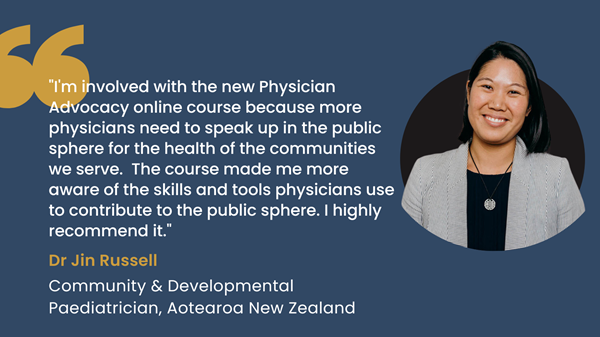
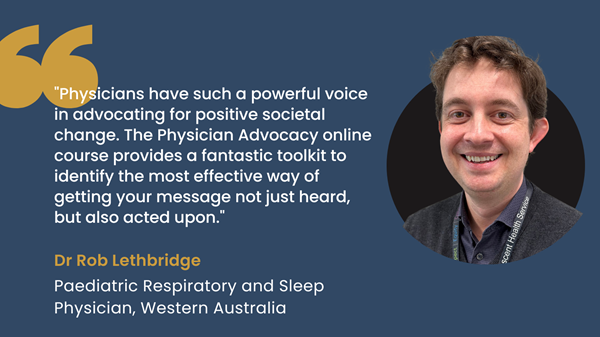

You are invited to the 2023 Networking Series. They are a series of free member networking evenings featuring a lively panel discussion. The first night in Whanganui-a-Tara Wellington was a big success. A feature of the event was a fascinating panel discussion about the physician of the future. Successful events have also been held in Perth and Darwin with those attending expressing their thanks for the opportunity to connect with friends and colleagues, as well as expand their networks. Over the coming months events are being held in Canberra, Adelaide, Launceston, Brisbane, Sydney and Tāmaki Makaurau Auckland. Find out more and register for your local event today.
Find out more
Supporting Professionalism in Practice – The Framework in Action is a new guide to help you meet the Professional Standards expected of all physicians. It is designed for clinical and non-clinical specialties, Divisions, Chapters and Faculties. Use the guide to structure performance discussions, develop personal development plans, and as a framework to support colleagues and enhance your own professionalism. It can also help you meet your MyCPD Category 2: Reviewing Performance and Category 3: Measuring Outcomes requirements. Access the guide and start reflecting today
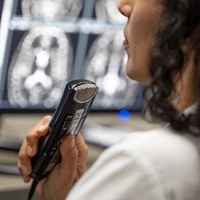
Listen now
This is the final episode in a five-part series about artificial intelligence in medicine. We start by weighing up the costs and benefits of automation in a health system that’s increasingly pushed beyond capacity. One of the biggest time sinks for health practitioners is filling out and searching through medical records. Some of this could be performed by natural language processors which are becoming more accurate thanks to deep learning.
The power of large language models has been demonstrated by the meteoritic uptake of ChatGPT and doctors are among those who have used it to summarise literature or draft letters. But professional organisations have raised concerns around the accuracy and privacy of the model and there have also been spooky demonstrations of its capacity for common sense and theory of mind.
Guests
- Affiliate Associate Professor Paul Cooper PhD FAIDH CHIA AFHEA GAICD, Deakin University
- Associate Professor Sandeep Reddy MBBS PhD IPFPH ECFMG CHIA FAcadTM FAIDH FCHSM SFHEA, Deakin University; Founder, MedAI
- Professor Brent Richards MBBS FRACP JJFICM, Gold Coast Hospital and Health Service; Director, IntelliHQ
Subscribe
Please visit the Pomegranate Health web page for a transcript and supporting references. Log in to MyCPD to record listening and reading as a prefilled learning activity. Subscribe to new episode email alerts or search for ‘Pomegranate Health’ in Apple Podcasts, Spotify, Castbox, or any podcasting app.
As part of a global movement, Evolve is a flagship initiative led by physicians, and supported by The Royal Australasian College of Physicians (RACP). Its goal is to drive high-value and high-quality care in Australia and Aotearoa New Zealand.
RACP Fellows can use Evolve activities to meet CPD requirements for Category 2 Reviewing performance and Category 3 Measuring outcomes. For example, you could audit your practice against a relevant Evolve recommendation, or measure outcomes related to implementation of an Evolve recommendation. For more information, refer to the MyCPD Framework.
Join the Evolve movement
We would like to thank everyone who contributed feedback to the Evolve Strategy 2022-26 and the Evolve Implementation Plan 2022-26 consultation summary. It involved a lot of time and work from the RACP Divisions, Faculties and Chapters, Consumer Advisory Group, the College Policy and Advocacy Council (CPAC) and Evolve Policy and Advocacy Interest Group members.
Read the Strategy l Read the consultation summary
The Department of Veterans’ Affairs may cover the cost of your patient's treatment, even if the cancer is unrelated to their service.
Please read these guidelines [PDF] to find out more about:
- if your patient's Veteran Card covers their cancer treatment
- information on completing the provider component of the D9215
- checking if the cancer treatment is covered
- considering mental healthcare for your patient
- seeking payment for your service.
Find out more
Do you know someone who would be great on a committee? Have you been considering joining one yourself but are not sure what it involves? Check out the current opportunities, which are regularly updated on the Expressions of Interest webpage.
There are currently over 40 opportunities open with vacancies for Basic Trainees and Advanced Trainees through to Fellows and Continuing Practice Development Leads.
Current trainee representative opportunities include:
Current Fellow and trainee representative opportunities:
Tuesday, 21 November from 7pm to 8pm AEST
Cervical screening can be uncomfortable for patients, leading to hesitancy and avoidance, but it is an important tool as we work to eliminate cervical cancer. By giving your speculum a sabbatical, you can offer a more patient-centred screening experience, eliminate discomfort, and improve screening rates. This webinar is presented by the RACGP in partnership with the Department of Health and Aged Care’s National Cervical Screening Program. It will equip not only GPs, but all health professionals, with the knowledge and skills to confidently guide patients through self-collection for cervical screening. It will provide resources, expert insights, and practical tips, for you to support your patients through self-collection.
Register now
The Voluntary Assisted Dying Conference 2023 is on Wednesday, 27 to Thursday, 28 September in Sydney and there is still time to register. The conference will bring together an array of leaders in Voluntary Assisted Dying (VAD) practice from Australia and Aotearoa New Zealand. This includes expert speakers from health, palliative care, policy and law.
Presentations and interactive discussions will enable attendees to:
- understand the experiences of health professionals delivering VAD care
- meet interstate colleagues and learn from counterparts in other jurisdictions
- gather insights from Chairs of VAD Review Boards, state health departments and Ministers
- explore innovations and new care models for VAD from within hospice and palliative care
- discuss, identify and align on areas for improvement
- shape collective policy priorities and make plans for future collaboration.
Bringing together a growing community of VAD clinicians, policymakers and peak bodies, the conference will discuss frontline experiences, explore new care models and innovations within hospice and palliative care, and identify and align policy areas for improvement. It will also provide a forum for those already providing VAD services and anyone who is considering training to support patients who make this choice.
Find out more and register
There’s a fact that looms large in healthcare - the less bullying, harassment, racism and discrimination in our workplaces, the better the culture will be and the better the health outcomes will be for staff and patients. Find out more about A Better Culture and ways you can get involved.
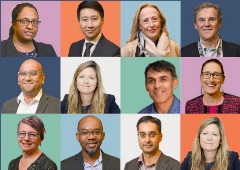 Whether you are a New Fellow, established within your career, or beginning to wind down for retirement, the RACP CPD Home can support you to meet your specialist regulatory requirements.
Whether you are a New Fellow, established within your career, or beginning to wind down for retirement, the RACP CPD Home can support you to meet your specialist regulatory requirements.
We have a long history as an accredited CPD provider within Australia and Aotearoa New Zealand, and our MyCPD team are at hand to provide you with tailored guidance throughout the annual CPD cycle. Plus, your RACP membership means you can access the RACP Online Learning platform for a selection of tools and resources relevant to you throughout your career.
You have never stopped learning, we’re here to make sure that continues. My RACP. MyCPD Home.
Find out more
Stay informed
Read other RACP eBulletins and access current news on the RACP Online Community (the ROC):
Join the conversation in the ROC